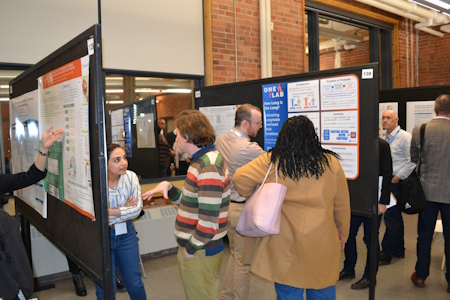SGPS Research Showcase

The School of Graduate and Postdoctoral Studies (SGPS) is excited to present the SGPS Research Showcase, Ontario Tech’s annual graduate student and postdoc research poster session. It provides all graduate students and postdoctoral fellows with an exciting opportunity to present their research or academic work to a broad audience in an engaging and visually impactful format.
Participants can choose to participate in two ways how to display their research findings. First, through a posters that communicates research, and methodologies, or through the Art of Imagery. The Art of Imagery, new this year, conveys students research through visual and creative arts. Both shape the significance of the students research to a diverse group of judges and attendees
This competition encourages students to distill complex ideas into clear and accessible visual presentations, making their research understandable to both specialists and non-specialists alike.
This dynamic event allows students to gain valuable experience in presenting their research, receive constructive feedback, and engage with peers, faculty, and the wider community. The Showcase serves as a platform for students to demonstrate the wide scope of innovative research and academic endeavours conducted within our university. By participating, students not only enhance their communication skills but also contribute to a vibrant academic exchange that fosters interdisciplinary collaboration and knowledge sharing.
*New this year, PhD and Master specific awards, plus the addition of the Art of Imgary: Research Transformed with its own award!
Why participate?
- Enhance Your Presentation Skills: Gain valuable experience in distilling and communicating complex research or academic concepts clearly and effectively to a diverse audience, both within and outside your field.
- Receive Constructive Feedback: Benefit from the opportunity to receive feedback from faculty, peers, and professionals, which can help you refine your research and presentation techniques.
- Increase Visibility: Showcase your innovative research or academic ideas to a broader audience, increasing its visibility and impact within the academic community and beyond.
- Build Your Professional Network: Connect with fellow researchers, faculty members, and industry professionals, fostering relationships that can lead to future collaborations and career opportunities.
- Boost Your CV: Participation in academic competitions like this one enhances your resume, demonstrating your commitment to research, your ability to communicate effectively, and your engagement with the academic community.
Congratulations to all participants in the 2024 Research Poster Showcase! This year, we were thrilled to host over 50 talented graduate students representing all faculties at the university. Their exceptional research and dedication were on full display, making this event a true celebration of innovation and academic excellence.
We are proud to recognize the outstanding achievements of our award winners. Click on the poster titles below to view the award-winning submissions.
Best Overall:
Jayda Hylton-Pelaia (Faculty of Health Sciences)
Enhancing Girls' Sports Participation: Understanding Parental Decision-Making and Developing an Evidence-Informed Toolkit
Sarah Kirkpatrick (Faculty of Social Science and Humanities)
Consent and Sexual Assault in Heterosexual versus Same-Sex Sexual Encounters
Best Visuals:
Hiral Mistry (Faculty of Education)
Fostering Educational Wellness: Insights from the Endocannabinoid System
Most Innovative:
Sergio Majluf Suarez (Faculty of Science)Photodetector for Biosensing: Dye-Sensitized Solar Cells for Hemoglobin Quantification
Congratulations to all for your incredible work and contributions to the academic community!